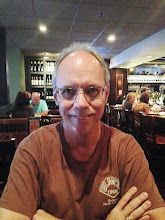Wow. It's been almost 4 years since my last post. And over that time, and over the past two months especially, the concepts of connection and oneness have become more and more front and center in my life again. Political changes in particular have led many of us to think more deeply about what these things mean and how we experience them in our lives.
So from that perspective I'm reposting here, with minor edits, some thoughts on forgiveness that I shared elsewhere after the national Capitol assault two weeks ago. Many will say it's too soon to be thinking of such things, and maybe they're right. But if we wait until things quiet down (assuming they will), will the conversation have the same impact? That said, my thoughts...
It seems many people are struggling with what forgiveness means and what it involves after that event. There are those who say that Christianity requires certain things of the offender before forgiveness can be offered.
While there are various interpretations of the concept of forgiveness and the dynamics involved, my understanding is that forgiveness requires nothing of the offender. It ultimately serves the sense of peace, union, and health, in all aspects, of the forgiver. That said, forgiveness doesn't mean acceptance and continued tolerance of the action of the offender. One forgives the person offending but not the offensive action itself. It doesn't mean that the forgiver says, in effect, "I didn't like what you did but it's ok. You can do whatever you want and I'm ok with it because I forgive you." It's entirely possible to be forgiving while also attending to one's own health and well being by remaining away from or protecting oneself from more such offenses, if there is cause to be concerned about that possibility. This is where the application to the insurrection event, and other previous perceived offenses by the current administration, best applies, I think. We can, if we choose, forgive the people involved, with their levels of fear, ignorance, ego, etc. that are ultimately behind such actions. But in so doing we aren't saying their actions are now acceptable to us and they're free to do them again without resistance.
Trying to assess and judge a person's level of true awareness and remorse before offering forgiveness is a losing game. Such things can never be accurately assessed by any other person and make forgiveness a transactional act, dependent on some change in the offender, i.e., "you give me this and then I'll give you that." Again, forgiveness serves the forgiver, not the offender. In my view of Christianity, and of forgiveness in general, it's repentance that serves the offender and seeks to restore union between themselves and those impacted by the offense. Ultimately I believe it's the loss of connection, between oneself and another and/or between oneself and one's god, in the religious sense, that's the true, underlying, ultimate loss that is sought to be regained.
So again, in this situation, those who feel impacted or harmed in any way by what happened can choose to forgive the offenders, but they don't choose to encourage, support, or allow such offenses to continue, for the sake of everyone involved. Those committing the offenses may choose to feel repentance for their actions, but their own sense of contrition and repentance is not a prerequisite for the forgiveness of others; nor is the forgiveness of others a prerequisite for their own repentance. Likewise, those who have held a different perspective from mine about the events of the past four years, 12 years, or whenever, can choose to forgive me for the role they perceive I've played in events that they've felt harmed by. Or they can choose to be repentant for their own roles in supporting events that have led to harming me or others in any way. None of that on anyone's parts requires those of opposing views to do or feel anything first.
For a real world presentation of all this by someone who suffered a terrible loss of a family member at the hands of another, watch https://www.ted.com/speakers/azim_n_khamisa or read any of Azim Khamisa's writings.
And FWIW, I offer all this as someone who lives outside of the mainstream Christian tradition. But that's a whole separate discussion.




0 comments:
Post a Comment